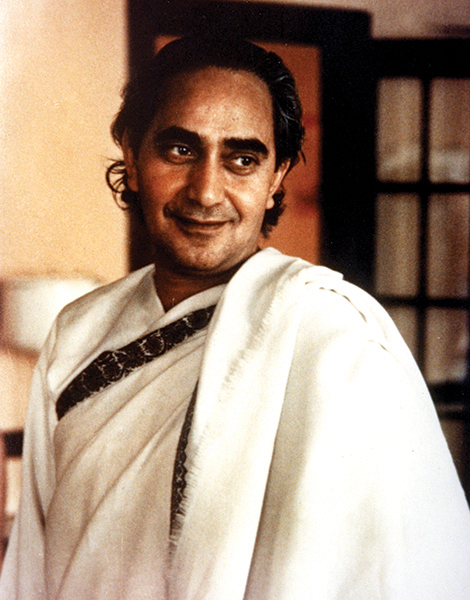Bhakti is a powerful path for learning to channel one’s emotional power, which arises from desires. Desires themselves spring from the four primitive urges—the drives for food, sex, sleep, and self-preservation, which exist in every living creature. But there is another inborn force within us that does not arise from these primitive foundations—the drive to know, experience, and enjoy Truth. It is this drive which gives rise to devotion and bhakti.
When the force and power of all our desires can be channeled toward the Divine, rather than toward attaining the charms of the external world, then love, the strongest force in the universe, lends its energy to the path. That love exists within all, and can be experienced when the mind is no longer dissipated by the ego and the objects of the senses. When the spark of that love is ignited, it can create a burning desire to experience union with the Absolute. That flame is capable of burning away all the little desires of life, until only one flame exists—the flame of devotion that burns eternally in the chamber of the heart.
This quality of one-pointed devotion can also be compared to a wave of joy and beauty that sweeps across all the little waves made by emotional distractions, and has such power that it can transform a human being. This is a state of surrender of one’s little self to a higher reality, in which one accepts oneself as being one with the Absolute. This is a subtle and profound transformation of the human heart. After this change has taken place, one does not necessarily have to stop his or her involvement with the world; instead, everything that is done is done with a new awareness. Then, everything becomes an act of devotion and worship, directed toward the Divine principle. One works, eats, talks, and sleeps—but these are no longer mundane activities. Instead, each of these actions is done with an awareness of the Divine and is transformed into an offering and a surrender of oneself.
Selfishness is the opposite of this process of surrender. When we are selfish, we seek to maintain the priorities of our own individual egos and personalities, and we deny the existence of any higher entity. This is why selfishness is so destructive to any sincere seeker on the spiritual path. When we are selfish we contract ourselves and think only in terms of “I, me, and mine,” which limits our ability to allow consciousness to unfold. When we expand our personalities through selflessness and surrender, we are actually allowing the expansion of consciousness and freeing ourselves from the prison of our own egos.
That is why love and non-violence are also so important on the path of bhakti. Learning to cultivate love on the human level in our daily relationships also serves to assist us in unfolding love for the Divine. Love expresses our awareness of the unity that exists within all. But it is very challenging to love, because it means surrendering all our expectations and demands. This concept of surrender does not mean surrendering ourselves to another person or allowing ourselves to be treated badly by others. Instead, surrender means surrendering the little self of the personality to the highest Self. When one cultivates this attitude, there is no sense of sorrow or deprivation, but only the desire to give and serve, and the ability to receive joy and delight from that process.
In the higher levels of bhakti and surrender, one actually begins to think of oneself as an instrument of the Divine, and every action is a means of expressing devotion. This is an unlimited and unconditional love for the Divine. When one lives in this state of consciousness, then many miracles and unusual things can be accomplished, because the seeker no longer thinks of himself or herself as separate from the One. This is the final stage of bhakti, in which one has united his or her consciousness with the Divine, and identifies with the Beloved.
Before this stage can be accomplished, however, there are preliminary levels in which one experiences bhakti from the perspective of duality and separation from the Divine. In many mystical traditions, the devotion of bhakti is expressed as the seeker’s longing for union with the Beloved. This theme can be found in the writings of some of the Christian saints, such as St. Teresa, and also in the devotion of Meera for Krishna. Many well known poets in the East, such as Kabir, Tagore, and Tulsidasa, also wrote beautiful devotional poetry that expressed their longing for union with the One.
Reprinted from Yoga International, Jan/Feb, 1992

